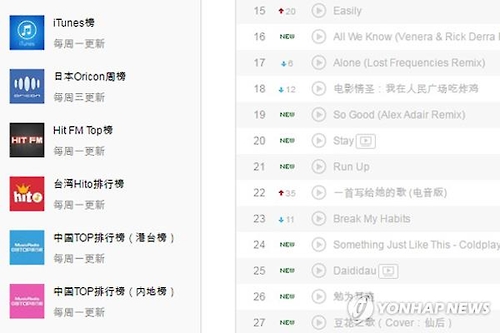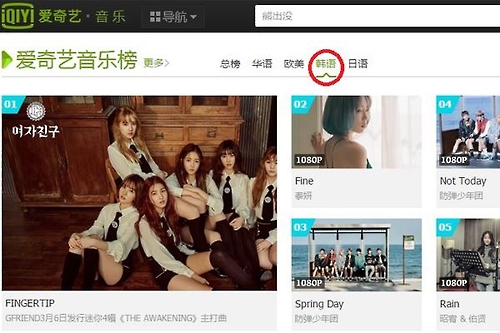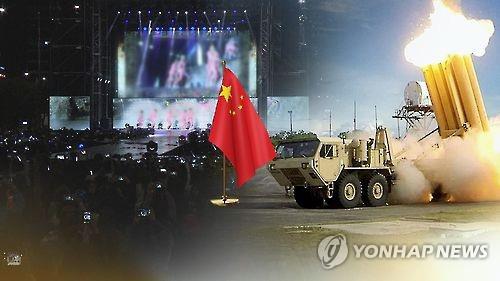- California Assembly OKs highest minimum wage in nation
- S. Korea unveils first graphic cigarette warnings
- US joins with South Korea, Japan in bid to deter North Korea
- LPGA golfer Chun In-gee finally back in action
- S. Korea won’t be top seed in final World Cup qualification round
- US men’s soccer misses 2nd straight Olympics
- US back on track in qualifying with 4-0 win over Guatemala
- High-intensity workout injuries spawn cottage industry
- CDC expands range of Zika mosquitoes into parts of Northeast
- Who knew? ‘The Walking Dead’ is helping families connect
Will K-pop also fall victim to China’s Korean product ban?
SEOUL, March 6 (Yonhap) — First came TV censorships of Korean stars. Then a ban on concerts, followed by an implicit prohibition of retail goods from South Korea.
Now, K-pop is also bracing for a possible export ban to China, the biggest single-nation market in the world, as Beijing continues its political hissy fit towards Seoul’s decision to deploy a high-tech U.S. anti-missile battery on its soil.
Since October, Beijing has denied Korean entertainers permission to perform or appear on Chinese television. More recently, it has ordered major travel agencies to stop selling tours to Korea in an apparent protest towards the decision to adopt the Terminal High Altitude Area Defense (THAAD) system.
While Korean artists were restricted from publicly promoting their work in China, access of Korean songs and music videos via streaming appeared as though it would continue as usual — that is, until news broke last week that NetEase, one of China’s top online content company also known as WangYi, got rid of its music chart dedicated to K-pop.

A screenshot from NetEase’s music service Web site. A K-pop chart menu, which was included in the left column, vanished from the page last week.
As of Monday afternoon, NetEase’s Korean music chart remained gone, while ones for Japan, the U.S. and the U.K. and even Taiwan were searched easily.
To be clear, that doesn’t mean Korean music is unavailable from the service. You can still listen to songs from Psy and other K-pop artists through NetEase. But still, the K-pop scene here naturally had its moment of hysteria, as China is one of the top consumers of Korean cultural products around the world.
But this could turn out as an isolated incident, as other Chinese services were found to be still running Korean music charts as of Monday.
A K-pop chart was visible on QQ Music, which is owned by Tencent and reportedly has some 100 million daily users, with “Let Me Love You” by Junggigo and EXO’s Chanyeol at top. Kuwo, another site, had a chart run by South Korean music company Mnet, available on its service, showing TWICE’s “Knock Knock” at No. 1.

A screenshot from iQiyi, a Chinese video streaming Web site, featuring K-pop artists. Inside of the red circle at the top reads “Korean.”
iQiyi, a Chinese video streaming site, also prominently featured Korean music videos, including the freshly released “Fingertip” video from Korean girl group GFriend.
“So far we haven’t experienced restrictions regarding online music or video distribution. Our Chinese partners haven’t commented on the matter as well,” a PR representative at a South Korean management agency said.
Officials at Korean music distributors, including Loen Entertainment and KT Music, have also commented that they haven’t run into signs of business restrictions in China.
The NetEase incident may turn out to be an isolated case. But what the music industry is more concerned about, disposing of a chart or not, is a blackout of all K-pop content — music and video — via Ali Music, QQ Music and other streaming giants that serves the greater Chinese-speaking market.
“With the Chinese government’s regulation having become more explicit, a movement towards greater restriction will become stronger,” Nam Sang-hyun, head of research at the Korea Foundation For International Culture Exchange, said.
Nam noted that the process in which South Korean music companies and Chinese partners renew content provision contracts in the future could possibly indicate the level of treatment by Chinese economic entities — government and the market alike — on Korean pop music.












